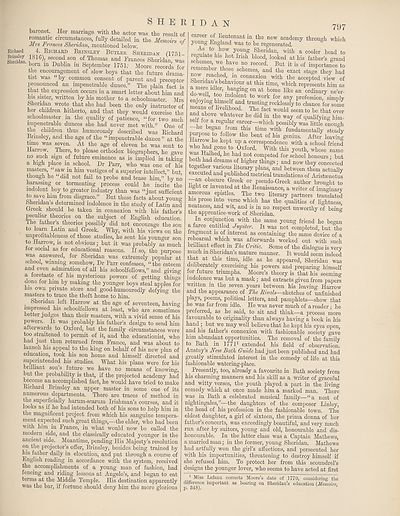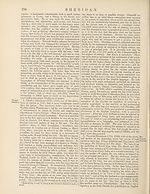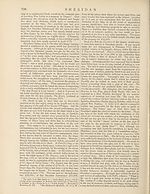Encyclopaedia Britannica > Volume 21, ROT-Siam
(807) Page 797
Download files
Complete book:
Individual page:
Thumbnail gallery: Grid view | List view

SHERIDAN
baronet. Her marriage with the actor was the result of
romantic circumstances, fully detailed in the Memoirs of
Mrs Jbranees Sheridan, mentioned below.
Richard 4. Richard Brinsley Butler Sheridan fmi_
££ i816^ se^.«on of Thomas and Frances Sheridan, wa^
■ born in Dublin in September 1751; Moore records for
the encouragement of slow boys that the future drama¬
tist was “ by common consent of parent and preceptor
pronounced an impenetrable dunce.” The plain fact is
that the expression occurs in a smart letter about him and
his sister, written by his mother to a schoolmaster. Mrs
Sheridan wrote that she had been the only instructor of
her children hitherto, and that they would exercise the
schoolmaster in the quality of patience, “for two such
impenetrable dunces she had never met with.” One of
the children thus humorously described was Richard
Brinsley, and the age of the u impenetrable dunce ” at the
time was seven. At the age of eleven he was sent to
Harrow. There, to please orthodox biographers, he gave
no such sign of future eminence as is implied in taking
a high place in school. Dr Parr, who was one of his
masters, “saw in him vestiges of a superior intellect,” but
though he “ did not fail to probe and tease him,” by no
harassing or tormenting process could he incite the
indolent boy to greater industry than was “just sufficient
to save him from disgrace.” But these facts about young
►Sheridan’s determined indolence in the study of Latin and
Greek should be taken in connexion with his father’s
pecuhar theories on the subject of English education,
ihe father s theories possibly did not encourage the son
to learn Latin and Greek. Why, with his views on the
unprofitableness of those studies, he sent his younger son
to Harrow, is not obvious; but it was probably as much
.or social as for educational reasons. If so, the purpose
was answered, for Sheridan was extremely popular at
school, winning somehow, Dr Parr confesses, “ the esteem
and even admiration of all his schoolfellows,?? and giving
a foretaste of his mysterious powers of getting things
done for him by making the younger boys steal apples for
his own private store and good-humouredly defying the
masters to trace the theft home to him.
. Sheridan left Harrow at the age of seventeen, having
impressed his schoolfellows at least, who are sometimes
better judges than their masters, with a vivid sense of his
powers. It was probably his father’s design to send him
afterwards to Oxford, but the family circumstances were
too straitened to permit of it, and the educationist, who
had just then returned from France, and was about to
launch his appeal to the king on behalf of his new plan of
education, took his son home and himself directed and
superintended his studies. What his plans were for his
brilliant son s future we have no means of knowing,
but the probability is that, if the projected academy had
become an accomplished fact, he would have tried to make
Richard Brinsley an upper master in some one of its
numerous departments. There are traces of method in
the superficially harum-scarum Irishman’s courses, and it
looks as if he had intended both of his sons to help him in
the magnificent project from which his sanguine tempera¬
ment expected such great things,—the elder, who had been
with him. in France, in what would now be called the
modern side, and the classically educated younger in the
ancient side. Meantime, pending His Majesty’s resolution
on the projector’s offer, Brinsley, besides being trained by
his father daily in elocution, and put through a course of
English reading in accordance with the system, received
the accomplishments of a young man of fashion, had
fencing and riding lessons at Angelo’s, and began to eat
terms at the Middle Temple. His destination apparently
was the bar, if fortune should deny him the more glorious
797
vrvnmr if 1jeutjcnant in the new academy through which
young England was to be regenerated.
As to how young Sheridan, with a cooler head to
regulate his hot Irish blood, looked at his father’s grand
rP^R’ Ve i° reC°rd- But ifc is of importance to
emember those schemes, and the exact stage they had
rea,ched> ln connexion with the accepted view of
behaviour at this time, which represents him as
a mere idler, hanging on at home like an ordinary ne’er-
enffivfn I/0 lndole^t t0 work for any profession, simply
enjoying himself and trusting recklessly to chance for some
means of livelihood. The fact would seem to be that over
and above whatever he did in the way of qualifying him¬
self for a regular career-which possibly was little enough
-he began from this time with fundamentally steady
purpose to follow the bent of his genius. After leaving
iarrow he kept up a correspondence with a school friend
t0i ^Xf0rd- With tkis y°utlh whose name
was Halhed, he had not competed for school honours; but
both had dreams of higher things; and now they concocted
together various iterary plans, and between them actually
executed and published metrical translations of Aristienetus
an obscure Greek or pseudo-Greek author brought to
light or invented at the Renaissance, a writer of imaginary
amorous epistles. The two literary partners translated
kis prose into verse which has the qualities of lightness
neatness, and wit, and is in no respect unworthy of being
the apprentice-work of Sheridan.
In conjunction with the same young friend he began
a farce entitled Jupiter. It was not completed, but the
fragment is of interest as containing the same device of a
rehearsal which was afterwards worked out with such
brilliant effect in The Critic. Some of the dialogue is very
much in Sheridan’s mature manner. It would seem indeed
that at this time, idle as he appeared, Sheridan was
deliberately exercising his powers and preparing himself
for future triumphs. Moore’s theory is that his seeming
indolence was but a mask; and extracts given from papers
written in the seven years between his leaving Harrow
and the appearance of The sketches of unfinished
plays, poems, political letters, and pamphlets—show that
he was far from idle. He was never much of a reader ; he
prefened, as he said, to sit and think—a process more
favourable to originality than always having a book in his
hand ; but we may well believe that he kept his eyes open,
and his father’s connexion with fashionable society gave
him abundant opportunities. The removal of the family
to Bath in 17711 extended his field of observation.
Anstey’s New Bath Guide had just been published and had
greatly stimulated interest in the comedy of life at this
fashionable watering-place.
Presently, too, already a favourite in Bath society from
his charming manners and his skill as a writer of graceful
and witty verses, the youth played a part in the living
comedy which at once made him a marked man. There
was in Bath a celebrated musical family—“a nest of
nightingales,”—the daughters of the composer Linley,
the head of his profession in the fashionable town. The
eldest daughter, a girl of sixteen, the prima donna of her
father’s concerts, was exceedingly beautiful, and very much
run after by suitors, young and old, honourable and dis¬
honourable. In the latter class was a Captain Mathews,
a married man; in the former, young Sheridan. Mathews
had artfully won the girl’s affections, and persecuted her
with his importunities, threatening to destroy himself if
she. refused him. To protect her from this scoundrel’s
designs the younger lover, who seems to have acted at first
_1 Miss Lefanu corrects Moore’s date of 1770, considering the
difference important as bearing on Sheridan’s education (Memoirs
p. 348).
baronet. Her marriage with the actor was the result of
romantic circumstances, fully detailed in the Memoirs of
Mrs Jbranees Sheridan, mentioned below.
Richard 4. Richard Brinsley Butler Sheridan fmi_
££ i816^ se^.«on of Thomas and Frances Sheridan, wa^
■ born in Dublin in September 1751; Moore records for
the encouragement of slow boys that the future drama¬
tist was “ by common consent of parent and preceptor
pronounced an impenetrable dunce.” The plain fact is
that the expression occurs in a smart letter about him and
his sister, written by his mother to a schoolmaster. Mrs
Sheridan wrote that she had been the only instructor of
her children hitherto, and that they would exercise the
schoolmaster in the quality of patience, “for two such
impenetrable dunces she had never met with.” One of
the children thus humorously described was Richard
Brinsley, and the age of the u impenetrable dunce ” at the
time was seven. At the age of eleven he was sent to
Harrow. There, to please orthodox biographers, he gave
no such sign of future eminence as is implied in taking
a high place in school. Dr Parr, who was one of his
masters, “saw in him vestiges of a superior intellect,” but
though he “ did not fail to probe and tease him,” by no
harassing or tormenting process could he incite the
indolent boy to greater industry than was “just sufficient
to save him from disgrace.” But these facts about young
►Sheridan’s determined indolence in the study of Latin and
Greek should be taken in connexion with his father’s
pecuhar theories on the subject of English education,
ihe father s theories possibly did not encourage the son
to learn Latin and Greek. Why, with his views on the
unprofitableness of those studies, he sent his younger son
to Harrow, is not obvious; but it was probably as much
.or social as for educational reasons. If so, the purpose
was answered, for Sheridan was extremely popular at
school, winning somehow, Dr Parr confesses, “ the esteem
and even admiration of all his schoolfellows,?? and giving
a foretaste of his mysterious powers of getting things
done for him by making the younger boys steal apples for
his own private store and good-humouredly defying the
masters to trace the theft home to him.
. Sheridan left Harrow at the age of seventeen, having
impressed his schoolfellows at least, who are sometimes
better judges than their masters, with a vivid sense of his
powers. It was probably his father’s design to send him
afterwards to Oxford, but the family circumstances were
too straitened to permit of it, and the educationist, who
had just then returned from France, and was about to
launch his appeal to the king on behalf of his new plan of
education, took his son home and himself directed and
superintended his studies. What his plans were for his
brilliant son s future we have no means of knowing,
but the probability is that, if the projected academy had
become an accomplished fact, he would have tried to make
Richard Brinsley an upper master in some one of its
numerous departments. There are traces of method in
the superficially harum-scarum Irishman’s courses, and it
looks as if he had intended both of his sons to help him in
the magnificent project from which his sanguine tempera¬
ment expected such great things,—the elder, who had been
with him. in France, in what would now be called the
modern side, and the classically educated younger in the
ancient side. Meantime, pending His Majesty’s resolution
on the projector’s offer, Brinsley, besides being trained by
his father daily in elocution, and put through a course of
English reading in accordance with the system, received
the accomplishments of a young man of fashion, had
fencing and riding lessons at Angelo’s, and began to eat
terms at the Middle Temple. His destination apparently
was the bar, if fortune should deny him the more glorious
797
vrvnmr if 1jeutjcnant in the new academy through which
young England was to be regenerated.
As to how young Sheridan, with a cooler head to
regulate his hot Irish blood, looked at his father’s grand
rP^R’ Ve i° reC°rd- But ifc is of importance to
emember those schemes, and the exact stage they had
rea,ched> ln connexion with the accepted view of
behaviour at this time, which represents him as
a mere idler, hanging on at home like an ordinary ne’er-
enffivfn I/0 lndole^t t0 work for any profession, simply
enjoying himself and trusting recklessly to chance for some
means of livelihood. The fact would seem to be that over
and above whatever he did in the way of qualifying him¬
self for a regular career-which possibly was little enough
-he began from this time with fundamentally steady
purpose to follow the bent of his genius. After leaving
iarrow he kept up a correspondence with a school friend
t0i ^Xf0rd- With tkis y°utlh whose name
was Halhed, he had not competed for school honours; but
both had dreams of higher things; and now they concocted
together various iterary plans, and between them actually
executed and published metrical translations of Aristienetus
an obscure Greek or pseudo-Greek author brought to
light or invented at the Renaissance, a writer of imaginary
amorous epistles. The two literary partners translated
kis prose into verse which has the qualities of lightness
neatness, and wit, and is in no respect unworthy of being
the apprentice-work of Sheridan.
In conjunction with the same young friend he began
a farce entitled Jupiter. It was not completed, but the
fragment is of interest as containing the same device of a
rehearsal which was afterwards worked out with such
brilliant effect in The Critic. Some of the dialogue is very
much in Sheridan’s mature manner. It would seem indeed
that at this time, idle as he appeared, Sheridan was
deliberately exercising his powers and preparing himself
for future triumphs. Moore’s theory is that his seeming
indolence was but a mask; and extracts given from papers
written in the seven years between his leaving Harrow
and the appearance of The sketches of unfinished
plays, poems, political letters, and pamphlets—show that
he was far from idle. He was never much of a reader ; he
prefened, as he said, to sit and think—a process more
favourable to originality than always having a book in his
hand ; but we may well believe that he kept his eyes open,
and his father’s connexion with fashionable society gave
him abundant opportunities. The removal of the family
to Bath in 17711 extended his field of observation.
Anstey’s New Bath Guide had just been published and had
greatly stimulated interest in the comedy of life at this
fashionable watering-place.
Presently, too, already a favourite in Bath society from
his charming manners and his skill as a writer of graceful
and witty verses, the youth played a part in the living
comedy which at once made him a marked man. There
was in Bath a celebrated musical family—“a nest of
nightingales,”—the daughters of the composer Linley,
the head of his profession in the fashionable town. The
eldest daughter, a girl of sixteen, the prima donna of her
father’s concerts, was exceedingly beautiful, and very much
run after by suitors, young and old, honourable and dis¬
honourable. In the latter class was a Captain Mathews,
a married man; in the former, young Sheridan. Mathews
had artfully won the girl’s affections, and persecuted her
with his importunities, threatening to destroy himself if
she. refused him. To protect her from this scoundrel’s
designs the younger lover, who seems to have acted at first
_1 Miss Lefanu corrects Moore’s date of 1770, considering the
difference important as bearing on Sheridan’s education (Memoirs
p. 348).
Set display mode to:
![]() Universal Viewer |
Universal Viewer | ![]() Mirador |
Large image | Transcription
Mirador |
Large image | Transcription
Images and transcriptions on this page, including medium image downloads, may be used under the Creative Commons Attribution 4.0 International Licence unless otherwise stated. ![]()
| Encyclopaedia Britannica > Encyclopaedia Britannica > Volume 21, ROT-Siam > (807) Page 797 |
|---|
| Permanent URL | https://digital.nls.uk/193637770 |
|---|
| Attribution and copyright: |
|
|---|---|
| Shelfmark | EB.17 |
|---|---|
| Description | Ten editions of 'Encyclopaedia Britannica', issued from 1768-1903, in 231 volumes. Originally issued in 100 weekly parts (3 volumes) between 1768 and 1771 by publishers: Colin Macfarquhar and Andrew Bell (Edinburgh); editor: William Smellie: engraver: Andrew Bell. Expanded editions in the 19th century featured more volumes and contributions from leading experts in their fields. Managed and published in Edinburgh up to the 9th edition (25 volumes, from 1875-1889); the 10th edition (1902-1903) re-issued the 9th edition, with 11 supplementary volumes. |
|---|---|
| Additional NLS resources: |
|

